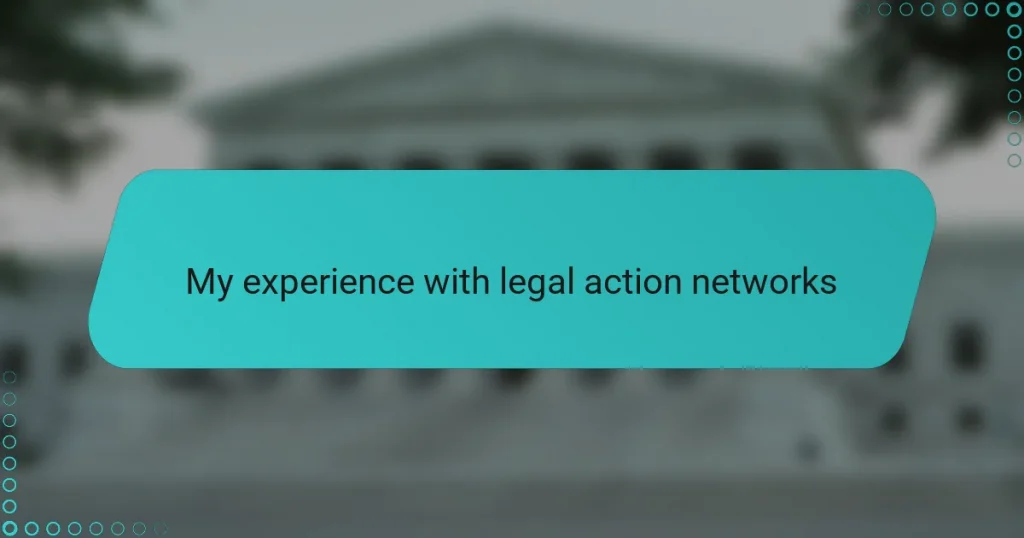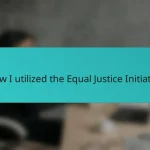Key takeaways
- Legal advocacy networks provide emotional and practical support, fostering a sense of community among individuals facing complex legal challenges.
- Collaboration within these networks enhances legal strategies and helps drive long-term policy reforms beyond individual cases.
- Choosing the right legal network involves aligning its focus with personal legal needs, ensuring accessibility, and valuing community support.
- Key lessons from legal advocacy include the importance of patience, the power of listening, and the need for flexibility in strategies.
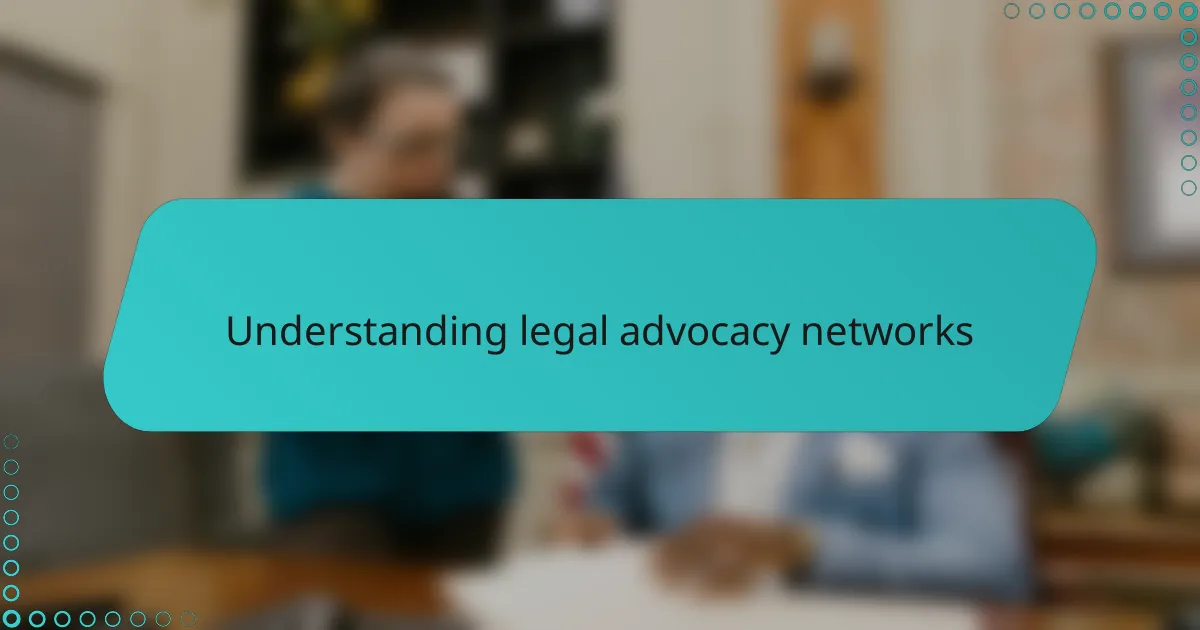
Understanding legal advocacy networks
Legal advocacy networks are powerful coalitions that connect individuals and organizations working toward justice and legal reform. When I first became involved, I was struck by how these networks create a sense of shared purpose—even when the issues at hand are complex and overwhelming. Have you ever felt isolated trying to navigate legal challenges? That’s where these networks become invaluable.
What I found particularly compelling is how these groups pool resources and expertise, making it easier to tackle cases that might otherwise feel insurmountable. It’s not just about individual victories; it’s about changing systems. This collective effort gave me hope during moments when the road seemed too long.
Thinking back, one of the most memorable aspects was the emotional support woven into the legal strategy. Advocacy networks don’t just offer legal advice; they provide a community that listens, understands, and motivates. That human connection can make all the difference in sustaining the fight for justice.
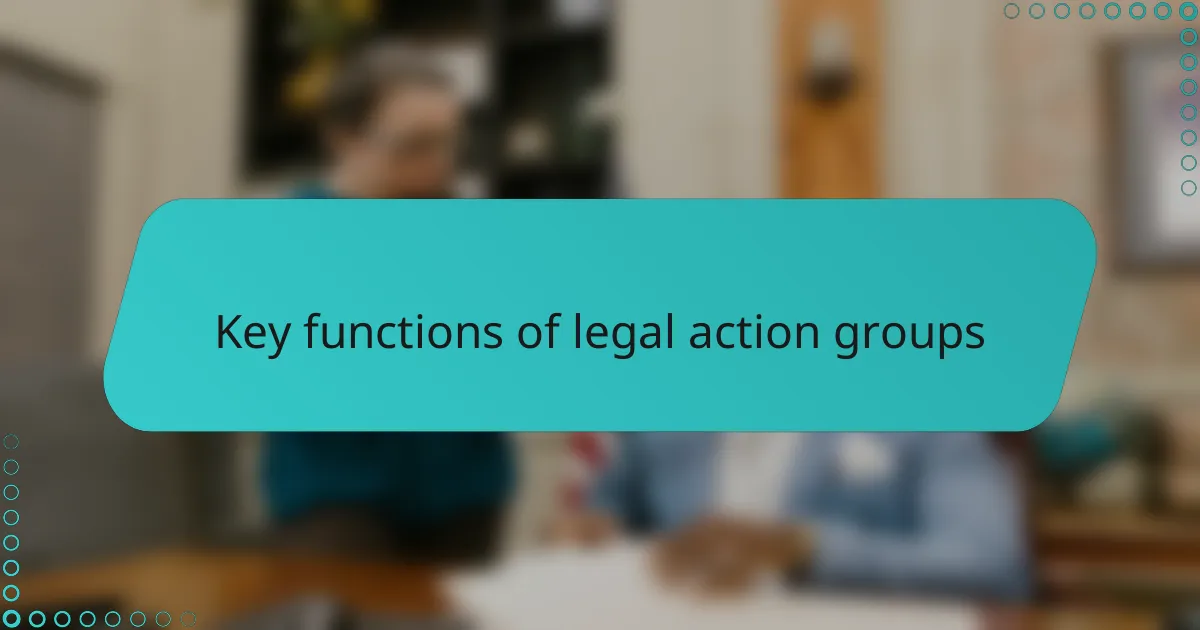
Key functions of legal action groups
One of the key functions of legal action groups that stood out to me is their role in coordinating legal strategies across multiple cases. It’s like having a team of experts working together, each bringing their unique skills to build stronger arguments. Have you ever tried solving a problem alone only to realize that a fresh perspective changes everything? That’s exactly what these groups offer—collaboration that magnifies impact.
Another critical function I noticed is their ability to influence policy change beyond individual lawsuits. Legal action networks don’t just react to problems; they actively seek to reform laws and regulations to prevent future injustices. This proactive approach made me see legal advocacy as a long-term commitment to justice, not just a series of courtroom battles.
Lastly, I can’t overlook the support systems these groups provide. When I faced moments of doubt, knowing that there was a community ready to back me up emotionally and legally made a huge difference. It reminded me that the fight for fairness is not solitary—it’s a shared journey, with highs and lows that are easier to navigate together.
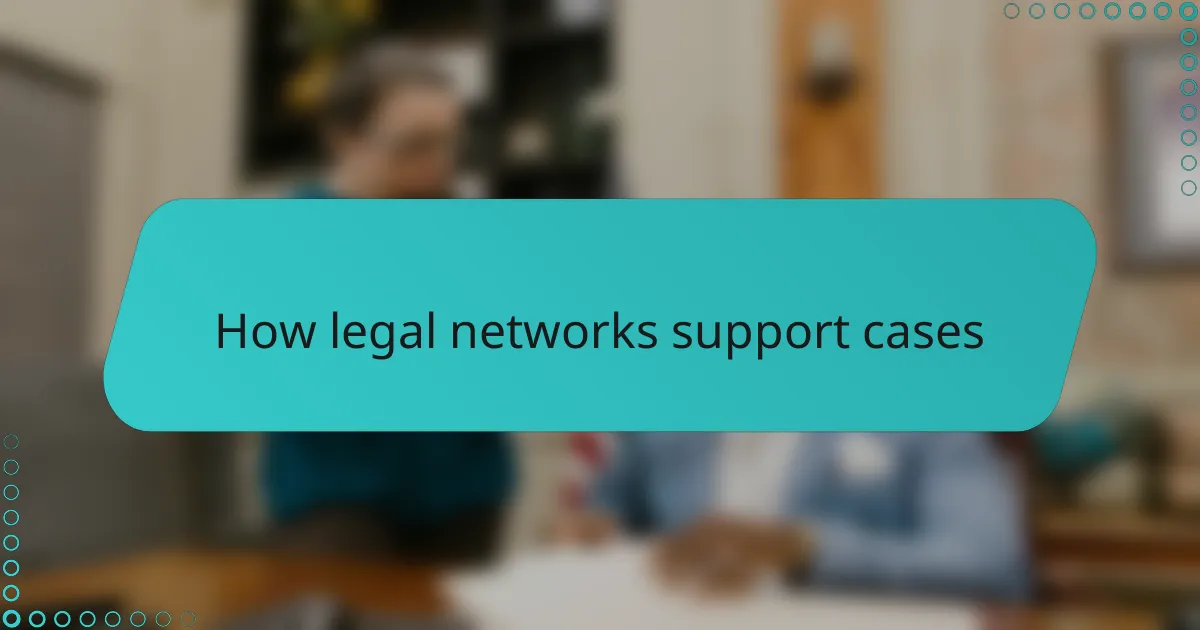
How legal networks support cases
What really impressed me about legal networks is how they streamline communication between various parties involved in a case. Imagine trying to coordinate multiple lawyers, experts, and activists without a clear system—it would be chaotic. These networks act like a central hub, making sure everyone is on the same page, which ultimately strengthens the case.
Another way legal networks support cases is by providing access to specialized knowledge that I wouldn’t have found on my own. I recall a moment when input from a seasoned civil rights attorney completely changed the direction of a case I was involved in. That kind of expertise can be a game-changer, especially when facing complex legal issues.
Have you ever felt overwhelmed by the sheer volume of paperwork and deadlines in a legal case? Legal networks often have dedicated teams or volunteers who help manage these practicalities. That support lifted a huge weight off my shoulders and allowed me to focus on the bigger picture—securing justice.
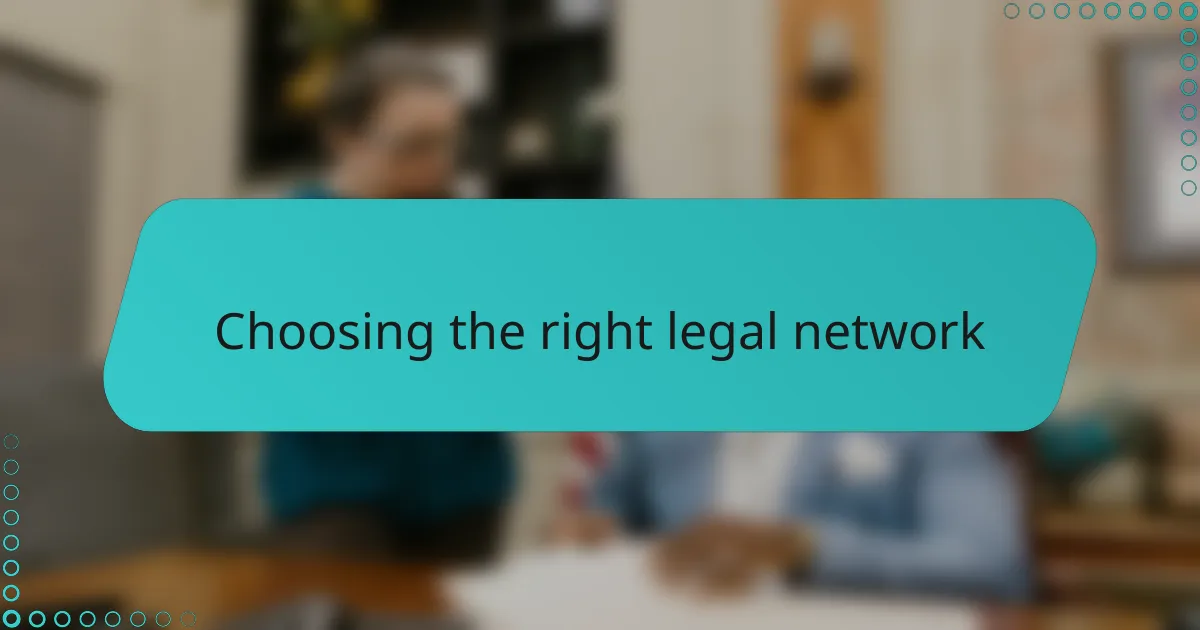
Choosing the right legal network
Choosing the right legal network can feel like finding a trusted partner in a complex journey. From my experience, it’s crucial to look beyond just the reputation—how well does the network’s focus align with your specific legal needs? For instance, I once joined a network that specialized in environmental law, but later realized I needed more support with civil rights issues, which taught me the importance of matching expertise to your situation.
I also learned that accessibility matters—a network might be outstanding on paper, but if communication is slow or unclear, the support can feel distant and frustrating. Have you ever felt stuck waiting weeks for a response when timely advice could make all the difference? Choosing a network that prioritizes responsiveness can save both time and emotional energy.
Finally, consider the community within the network. The encouragement and shared experiences that come from being part of a group genuinely invested in your cause made a huge difference for me. When doubts crept in, knowing others had faced similar challenges and were rooting for success kept me going. Isn’t that kind of solidarity exactly what we need when confronting tough legal battles?
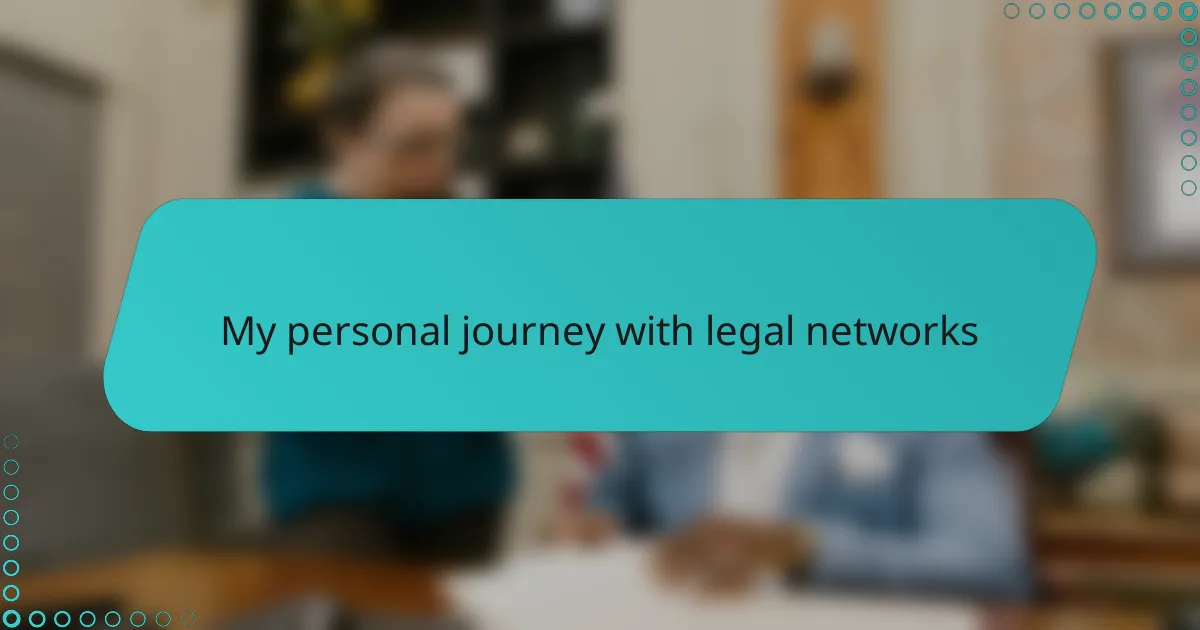
My personal journey with legal networks
When I first connected with a legal action network, I honestly felt a mix of relief and hesitation. Could a group really make that much difference in navigating such complicated legal terrain? But as I shared my concerns and listened to stories from others, I realized I wasn’t alone—and that support felt like a lifeline.
One moment that really stuck with me was when a seasoned advocate in the network took the time to explain a complex legal concept in simple terms. That clarity transformed my confidence and gave me a new sense of agency in my case. Have you ever had someone demystify something that seemed impossible? That’s exactly the kind of empowerment these networks offer.
Over time, being part of a legal network became less about just winning a case and more about belonging to a community with shared values and goals. Even on tough days, that sense of connection kept me motivated. I often found myself thinking, if we can tackle this together, change is truly possible.
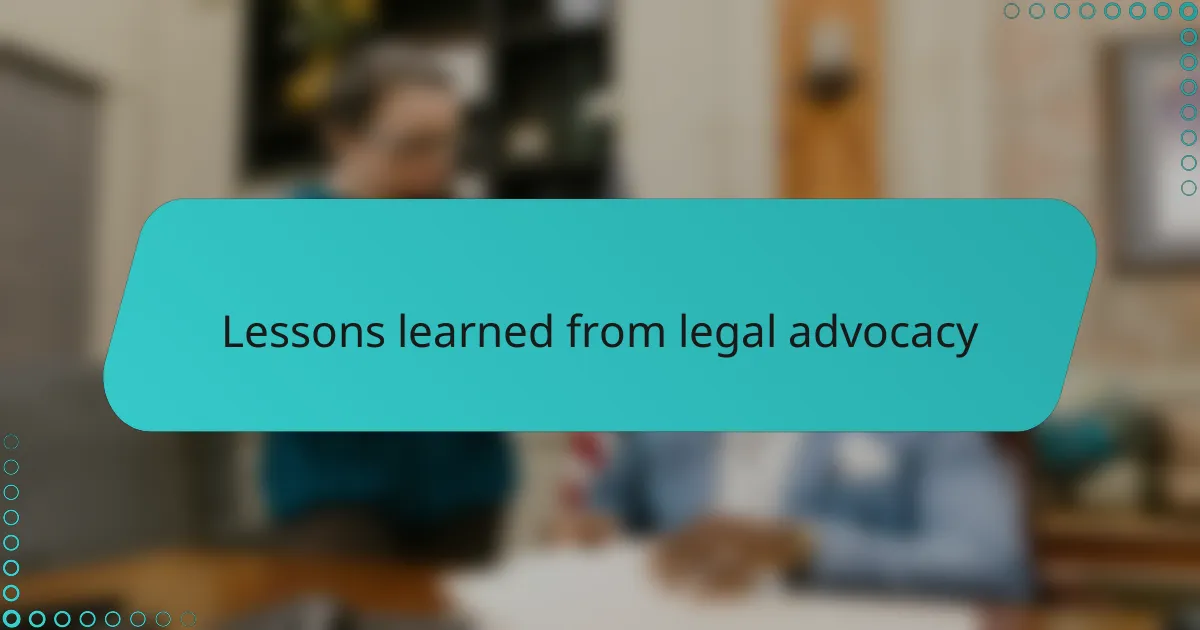
Lessons learned from legal advocacy
One lesson I learned is that patience is crucial in legal advocacy. Progress often comes in small steps rather than big leaps, and it’s easy to feel frustrated when change seems slow. Have you ever experienced the temptation to give up because results didn’t show right away? From my experience, persistence and steady effort within a supportive network make all the difference.
Another insight that stayed with me is the power of listening. Legal advocacy isn’t just about presenting facts or arguing cases; it’s about truly understanding the people affected and their stories. When I shifted my focus from winning arguments to hearing voices, the work felt more meaningful and effective.
Finally, I realized that flexibility matters more than I expected. Laws and social contexts evolve, and so must the strategies we use. Early on, I clung tightly to a single plan, but being open to new ideas—especially from others in the network—led to breakthroughs I hadn’t imagined. Isn’t it amazing how collaboration not only strengthens cases but also broadens your perspective?
